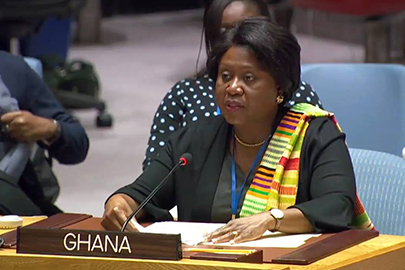United Nations urged to include more women at the decision-making table
 At the UN Security Council on October 25, 2018, Ambassador Martha Pobee, Permanent Representative of Ghana to the United Nations urged Member States to include more women at the decision-making table. She stated that “We need more women in conflict prevention and on negotiating teams. It is our responsibility to make this happen in the shortest possible time through our continued engagement and support”.
At the UN Security Council on October 25, 2018, Ambassador Martha Pobee, Permanent Representative of Ghana to the United Nations urged Member States to include more women at the decision-making table. She stated that “We need more women in conflict prevention and on negotiating teams. It is our responsibility to make this happen in the shortest possible time through our continued engagement and support”.
Ambassador Martha Pobee was speaking on behalf of the Group of Friends of the African Women Leaders Network, a cross-regional group of countries committed to ensuring that African women participate actively in the peace and security agenda of the United Nations. She expressed her appreciation to the Bolivian presidency of the UN Security Council for convening such an open debate on the important agenda of women, peace, and security, and thanked the Secretary-General for his report on this item which captured the challenges as well as opportunities presented to member states and stakeholders in the global effort to prevent conflict and sustained peace through an enhanced gender-sensitive lens.
She told the day-long debate in the Security Council that women were already engaged and were ready to play their role in those efforts. She informed the Council that Ghana continued to take necessary measures to address structural barriers that impede women’s political participation, economic empowerment and role in decision-making. She recounted recent achievements in this regard ,including the appointment of women to key cabinet positions, military and law enforcement agencies, justice institutions as well as peacebuilding and conflict prevention institutions.
Ghana’s Ambassador also stated that her country was also one of the 23 African countries that had developed national action plans for the implementation of Security Council resolution 1325 on Women, Peace and Security. The Government of Ghana is currently in the process of formulating Ghana’s national action plan in collaboration with relevant stakeholders and in so doing is addressing challenges and gaps experienced in the first action plan such as the lack of adequate funding effective localization, monitoring, and evaluation within the framework of the ECOWAS regional action plan.
